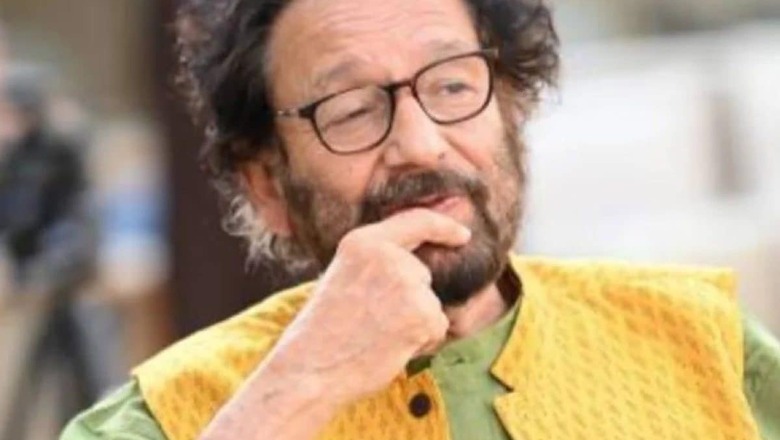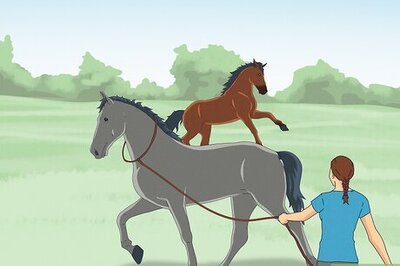
views
Often referred to as The Man With The Midas Touch, filmmaker Shekhar Kapur boasts of a robust filmography that has garnered the arduous trifecta of acclaim, accolades, and awards. While his directorial debut Masoom (1983) achieved a cult status over the years, Mr. India (1989) remains a trailblazer and one of the most iconic films of Indian cinema. Bandit Queen (1994) won the prestigious National Awards and Elizabeth (1998) bagged seven nominations at the Academy Awards. Kapur is widely regarded for his avant-garde approach and treatment and he feels that living a not-so-conventional life is largely reflected in his work and vision.
About 15 years after Elizabeth: The Golden Age (2007), he returned to the director’s chair with the romantic comedy What’s Love Got To Do With It (2022). After its world premiere at the Toronto International Film Festival and a big win at the Rome Film Fest, it was finally released in India last Friday (March 17). Headlined by the likes of Shabana Azmi, Emma Thompson, and Lily James, it casts the spotlight on assisted marriages and finding love in a world taken over by dating apps.
In an exclusive chat with News18, Kapur attributes his style of making films to his growing up years in London in the late 1980s. Walking down the lanes and shedding light on his earlier years, he tells us, “I was part of the new music revolution. When I met Mick Jagger (English musician) for the first time, I told him that the first time I saw him was when he sang ‘I Can’t Get No Satisfaction’ in Hyde Park. I was also a part of the big sexual revolution. We didn’t have dating apps back then. We were a lot freer and we met each other at restaurants or in parks.”
He reveals that many of his romantic relationships stemmed from casually meeting women in the British capital. “A lot of my relationships happened by casually walking into a park and saying hello to somebody. So, I wouldn’t say that I missed out on dating apps but those were different times. It [dating] was done through music and it has gone through a vast sea change,” he shares.
Talking about how his experiences have coloured his process of telling stories, Kapur remarks, “At that time, we relooked at our own model standards. I was a middle-class boy from India thrown into London and I became completely experimental. So, everything I know and feel wonder about has to go into everything that I make.”
Yet another aspect of his storytelling that has left many fascinated is his women. They call the shots, are unafraid to speak their minds, and are unapologetic about being themselves, flawed but extremely real. Sharing his thoughts on liberal women making their own choices today, The Four Feathers (2002) director elaborates, “There were two sexual revolutions for women. One was the pill. Suddenly, they were free of being pregnant and they could make their own decisions about sexuality. In Punjab, we were told that ladki ko sharma te rehna chahiye. That was a huge imposition and it led to all kinds of ideas. Dating apps have taken that away. No longer does a girl need to come in and be shy and wait to be approached. She can just tell a man that she likes him and wants to have sex with him, and it’s acceptable. It was the second sexual revolution and made men and women equal.”
So, what are his thoughts on love and marriages today? “In this moment of equality when you’re experimenting with sexualities freely, we wonder where love and intimacy stands. Most of the girls and the men, who are on dating apps, that I talk to say that they’re looking for a certain intimacy with somebody,” the 77-year-old states, adding, “They may not be looking for long-term relationships but those moments of love and relationship are really important. Can casual sex lead to those moments? Maybe. On the other hand, do arranged marriages lead to those moments? Maybe. Everybody has to do what they’ve to do.”
But he’s quick to state that the young generation finds it tougher to find love. “I don’t know how young people handle it. We were a lot safer and we had locks on us. There were doors we couldn’t go through. Now, there are no boundaries. Without the boundaries, you’re responsible for what you do and that’s tough,” he avers.
Having seen the traditional world transitioning into a modern entity, he decided to look at What’s Love Got To Do With It through a personal lens. “When I was talking to Lily, I told her that her character is a tumble dryer, she goes round and round trying to find a life. Because of the technologies of dating apps and the modern world, the tumble dryer is driving much faster than we ever thought it might. And in that fast-moving tumble dryer, you need to find love and intimacy, which we all believe is a moment of stillness. When Lily and I first started talking, it was the lockdown and I was up in the Himalayas and she was in London. We couldn’t meet and had to WhatsApp each other. These are the questions we kept thinking of and talking about,” he recalls.
Read all the Latest Movies News here
















Comments
0 comment